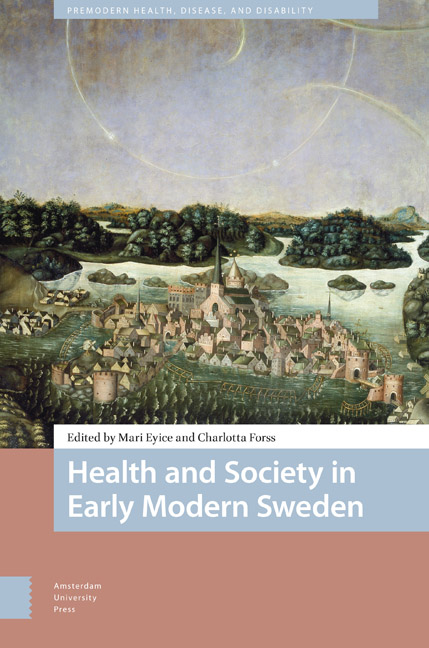Book contents
- Frontmatter
- Contents
- List of Tables and Figures
- Acknowledgements
- 1 Meanings of Health in Early Modern Sweden
- 2 Illness as Incapacity to Work in Early Modern Sweden
- 3 The Body in the Bathhouse: Health and Bathing in Early Modern Sweden
- 4 ‘Somewhat Heated, Quick and Lively’ : Humoral Explanations of the Learning Difficulties of Charles XI of Sweden (1655–1697)
- 5 Health in Body and Soul in a Female Birgittine Convent 1516–1522
- 6 Curing Madness and Mental Disturbances : Religious Healing Activities in Early Modern Swedish Local Communities
- 7 Not Quacks but Close : Reappraising the Role of Physicians on the Eighteenth-Century Medical Market
- 8 Gender, Health, and Hair in Sweden, 1740–1840
- 9 Gender Norms and Early Modern Healthcare : Barber-Surgeons in Sweden c. 1600–1900
- Epilogue : Epistemologies of Body and Soul: Considering the Early Modern and (Late) Modern History of Health
- Index
4 - ‘Somewhat Heated, Quick and Lively’ : Humoral Explanations of the Learning Difficulties of Charles XI of Sweden (1655–1697)
Published online by Cambridge University Press: 16 April 2024
- Frontmatter
- Contents
- List of Tables and Figures
- Acknowledgements
- 1 Meanings of Health in Early Modern Sweden
- 2 Illness as Incapacity to Work in Early Modern Sweden
- 3 The Body in the Bathhouse: Health and Bathing in Early Modern Sweden
- 4 ‘Somewhat Heated, Quick and Lively’ : Humoral Explanations of the Learning Difficulties of Charles XI of Sweden (1655–1697)
- 5 Health in Body and Soul in a Female Birgittine Convent 1516–1522
- 6 Curing Madness and Mental Disturbances : Religious Healing Activities in Early Modern Swedish Local Communities
- 7 Not Quacks but Close : Reappraising the Role of Physicians on the Eighteenth-Century Medical Market
- 8 Gender, Health, and Hair in Sweden, 1740–1840
- 9 Gender Norms and Early Modern Healthcare : Barber-Surgeons in Sweden c. 1600–1900
- Epilogue : Epistemologies of Body and Soul: Considering the Early Modern and (Late) Modern History of Health
- Index
Summary
Abstract
This chapter explores the education of King Charles XI. The king struggled when learning to read and his teacher struggled to understand and alleviate his pupil's difficulties. The teacher claimed that the king's difficulties were a result of a heroic talent, characteristic of monarchs. Deterministic views of individual talent could serve to reinforce the hierarchical relations of seventeenth-century estate society, but it could also benefit a few talented men from the lower orders. Even in a king, the expectation of innate talent had a meritocratic side, incompatible with hereditary monarchy. The young king was expected to have an exceptional talent, but when this turned out to be unsuitable for academic study, political ideology and pedagogical theory conflicted, while also being unhelpful to the royal pupil.
Keywords: learning difficulties, ingenium, talent, Charles XI of Sweden, Emund Gripenhielm
Introduction
In this chapter, I will explore medical ideas in the context of royal instruction in Sweden during the seventeenth century. In particular, I will look at the young Charles XI, well known as the king who introduced absolutism in Sweden during the latter part of his reign, which lasted for thirty-seven years (1660–1697). Long before that, while the country was still ruled by a regency government during his minority, the boy king Charles struggled with learning how to read. This chapter will examine how the king's teacher tried to explain Charles's difficulties by using the medical and pedagogical concepts of the period. Emund Figrelius Gripenhielm (1622–1675) had been chosen as Charles's tutor by the king's father, who had already employed Figrelius for other important tasks. Figrelius was appointed by Charles X on his deathbed, and was ennobled under the name Gripenhielm when he became the young king's teacher. Prior to that, Figrelius had been a university professor, but also an active diplomat and secretary in the royal chancery. Already as a student at Uppsala, Figrelius had worked as a tutor to a young aristocrat. Together with his student, he had undertaken a five-year grand tour of Europe. This provided ample experience as a private teacher.
- Type
- Chapter
- Information
- Health and Society in Early Modern Sweden , pp. 83 - 100Publisher: Amsterdam University PressPrint publication year: 2024



